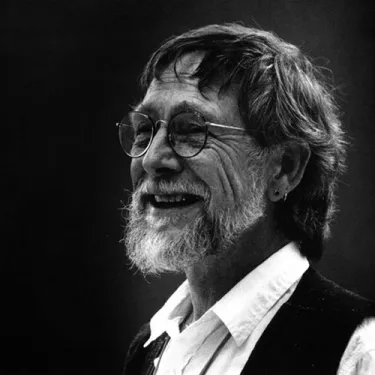Gary Snyder
Visiting Poet

Gary Snyder has said, “I hold the most archaic values on earth,” extending even to the Paleolithic. His work is informed by his studies in Zen Buddhism and Asian languages, as well as a deep, earned knowledge of the natural world. While living in Japan for 12 years, he worked as a translator of Zen texts, also traveling and writing prolifically, working to see past the ignorance and unbalance prevalent in our dealings with the life around us and to divine the true nature of his subjects rather than give them his own meanings. His words ring and resonate with an understanding of the things around him, revealing to the reader truths which seem to have been evident all along.
In his first volume, Riprap, published in 1959, Snyder describes his works: “These poems, people,/lost ponies with/Dragging saddles/and rocky sure-foot trails.” The poet creates a verbal riprap, rock path by which we may cross with him the infinite terrains of ecology and human experience. His career, as Glyn Maxwell noted, “has been a remarkable combination of the academic and the contemplative, spiritual study and physical labor.” Snyder has been likened by some to a modern-day Henry David Thoreau, and the poet Edward Hirsch has called him “the most intimate and mindful of poets.”
Snyder’s honors include many for poetry, as well as for ecological literature. He has been awarded the Bollingen Poetry Prize, the Orion Society’s John Hay Award for Nature Writing, and a Pulitzer Prize for Turtle Island in 1975. He was also the first American literary figure to receive the Buddhist Transmission Award, for distinctive contributions in linking Zen thought and respect for the natural world across a lifelong body of poetry and prose. Snyder currently teaches at the University of California at Davis, where he lectures on literature and ecology.
Select Poems
Lay down these words
Before your mind like rocks.
placed solid, by hands
In choice of place, set
Before the body of the mind
in space and time:
Solidity of bark, leaf, or wall
riprap of things:
Cobble of milky way,
straying planets,
These poems, people,
lost ponies with
Dragging saddles
and rocky sure-foot trails.
The worlds like an endless
four-dimensional
Game of Go.
ants and pebbles
In the thin loam, each rock a word
a creek-washed stone
Granite: ingrained
with torment of fire and weight
Crystal and sediment linked hot
all change, in thoughts,
As well as things.
From THE GARY SNYDER READER (Counterpoint, 1999)
“The 1.5 billion cubic kilometers of water on the earth are split
by photosynthesis and
reconstituted once every two million years or so.”
A day on the ragged North Pacific coast get soaked by whipping mist,
rainsqualls tumbling, mountain mirror ponds, snowfield slush, rock-
wash creeks, earfuls of falls, sworls of ridge-edge snowflakes, swift grav-
elly rivers, tidewater crumbly glaciers, high hanging glaciers, shore-side
mud pools, icebergs, streams looping through the tideflats, spume of
brine, distant soft rain drooping from a cloud,
sea lions lazing under the surface of the sea-
We wash our bowls in this water
It has the flavor of ambrosial dew-
.
Beaching the raft, stagger out and shake off wetness like a
bear,
stand on the sandbar, rest from the river being
upwellings, sideswirls, backswirls
curl-overs, outripples, eddies, chops and swells
wash-overs, shallows confluence turbulence wash-seam
wavelets, riffles, saying
“A hydraulic’s a cross between a wave and a hole,
-you get a weir effect.
Pillow-rock’s total fold-back over a hole,
it shows spit on the top of the wave
a haystack’s a series of waves at the bottom of a tight
channel
there’s a tongue of the rapids — the slick tongue — the
‘v’—
some holes are ‘keepers,’ they won’t let you through;
eddies, backflows, we say ‘eddies are your friends.’
Current differential, it can suck you down
vertical boils are straight-up eddies spinning,
herringbone waves curl under and come back.
Well, let’s get going, get back to the rafts.”
Swing the big oars,
head into a storm.
We offer it to all demons and spirits
May all be filled and satisfied.
Om macula sai svaha!
.
Su Tung-p’o sat out one whole night by a creek on the slopes of Mt. Lu.
Next morning he showed this poem to his teacher:
The stream with its sounds is a long broad tongue
The looming mountain is a wide-awake body
Throughout the night song after song.
How can I speak at dawn.
Old master Chang-tsung approved him. Two centuries later Dogen said,
“Sounds of streams and shapes of mountains.
The sounds never stop and the shapes never cease.
Was it Su who woke
or was it the mountains and streams?
Billions of beings see the morning star
and all become Buddhas!
If you, who are valley streams and looming
mountains,
can’t throw some light on the nature of ridges and rivers,
who can?”
From MOUNTAINS AND RIVERS WITHOUT END (Counterpoint, 1996)
Eating the living germs of grasses
Eating the ova of large birds
the fleshy sweetness packed
around the sperm of swaying trees
The muscles of the flanks and thighs of
soft-voiced cows
the bounce in the lamb’s leap
the swish in the ox’s tail
Eating roots grown swoll
inside the soil
Drawing on life of living
clustered points of light spun
out of space
hidden in the grape.
Eating each other’s seed
eating
ah, each other.
Kissing the lover in the mouth of bread:
lip to lip.
From REGARDING WAVE (New Directions, 1970)